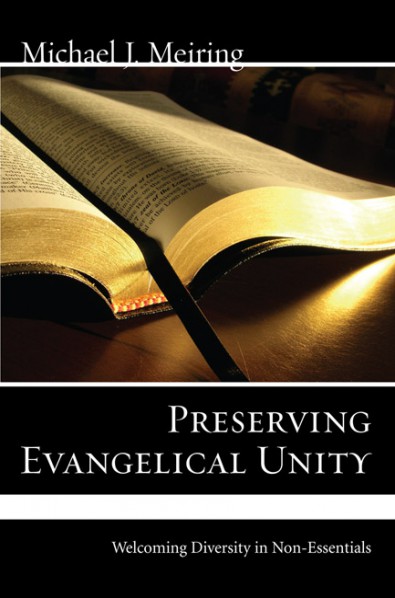Preserving Evangelical Unity
 Michael L. Meiring, ed., Preserving Evangelical Unity: Welcoming Diversity in Non-Essentials (Eugene, OR: Wipf and Stock, 2009).
Michael L. Meiring, ed., Preserving Evangelical Unity: Welcoming Diversity in Non-Essentials (Eugene, OR: Wipf and Stock, 2009).
In Preserving Evangelical Unity, editor Michael L. Meiring brings together a variety of voices from within the Evangelical community to discuss an assortment of theological issues for which there is no uniformity in belief. He maintains that the early Church can be characterized by its harmoniousness but this type of solidary is lacking within the contemporary context. According to the editor, theological dissidence could be the most significant problem facing the Church today. Meiring argues that Christians can disagree on certain non-essential beliefs, while still enjoying common fellowship, but he warns against “extreme evangelical fundamentalists” who say that one must conform to a certain standard – typically their standard – in order to be considered a Christian. However, Meiring insists that three beliefs are imperative for all Christians to hold: the Trinity, original sin, and salvation by grace. Beyond these beliefs, he argues that Evangelicals can be united despite their differences.
The bulk of this volume is dedicated to exploring a number of non-essential topics that include divine sovereignty (a Calvinist view versus an Arminian view), baptism (infant versus believer’s baptism), dispensationalism, charismatic gifts (a cessationist versus a Pentecostal perspective), and women in leadership. Each topic is given attention from two different contributors, mostly having very divergent views and often from different backgrounds. After each contributor presents their opinion on one of the aforementioned topics, their counterpart provides a counter response. On several occasions a reply to the counter response is offered as well. This format allows for extended conversations to occur between the contributors and for readers to analyze the nuances and particular concerns raised by the contributors.
Every contributor is gracious and respectful of their dialogue partner, yet they are not reserved in pointing out their disagreements. Pentecostals may be particularly interested in the chapters concerning the charismatic gifts, but each chapter raises theological issues that are both common within Evangelical circles and deserving of attention. In my opinion one of the best chapters is Eric Severson’s essay on infant baptism. If one cannot devote themselves to reading the entire book, I highly recommend his chapter. This book can be credited with displaying heterogeneity among Evangelicals, which has many benefits, but I would have appreciated more content dedicated to promoting their unity. Two pages within the appendices are given to a document entitled “Our Unity in the Essentials,” which was also “signed” by each contributor. However, nothing is said about the manner in which this document was constructed and how it came to be adopted. My other concern is that Meiring insists on establishing the Trinity as an essential belief, but many Christian, including Oneness Pentecostals, are likely to have concerns about this standpoint. Thus some of his essentials are contestable and possibly not so indispensable. In conclusion, this volume may benefit those who are looking to explore diversity within Evangelical theology, but I question how much it promotes or even preserves unity. It seems Meiring intends to do so by rejecting dogmatism and modeling collegiality among some Evangelicals, but, in the very least, I think that a concluding chapter to assist the reader in thinking through these contentious issues would have been helpful.
Reviewed by David Bradnick
Publisher’s page: http://wipfandstock.com/preserving-evangelical-unity.html
Category: Ministry, Summer 2016


